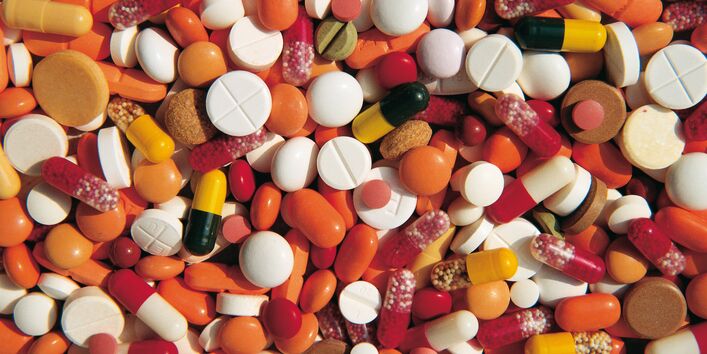Antibiotic resistance: Study shows high pressure to take action
Increasing antibiotic resistance is jeopardising healthcare and leading to a high number of premature deaths worldwide. For this reason, the AOK medical insurance association, under the leadership of AOK Baden-Württemberg, together with the IWW Rhine-Westphalian Institute for Water Research and with the support of the German Environment Agency, launched a pilot study on ecological sustainability in antibiotic supply in 2020. The world's first study with detailed insights into global antibiotic production will now be presented at a press conference on Friday (10/11/2023). “Our findings reveal an urgent need for action that can no longer be ignored in political discussions,” says Johannes Bauernfeind, Chair of the Board of Directors of AOK Baden-Württemberg, summarising the results. “The supply of medicines can only be stabilised in the long term if it is made sustainable in all three aspects - economic, social and ecological.”
As the nationwide lead negotiator for the AOK's pharmaceutical discount agreements, AOK Baden-Württemberg implemented an optional sustainability criterion in the tender for antibiotics for the first time three years ago in order to incentivise the environmentally friendly production of antibiotics. This means that pharmaceutical companies can receive a bonus on their tender if they voluntarily undertake to comply with effect-based maximum concentrations in production wastewater.
“Contaminated production wastewater is an important reason for the development of antibiotic resistance, in addition to the risk posed by the massive use of antibiotics in human and veterinary medicine,” explains Dr Malgorzata Debiak, Head of the Pharmaceuticals Division at the German Environment Agency. The German Environment Agency is providing scientific support for the study and advised the AOK on the contractually agreed maximum concentrations. “The spread of multi-resistant microorganisms in the environment has an impact on human health. If multi-resistant germs can spread in and via contaminated production wastewater, the effectiveness of antibiotics is severely jeopardised,” says Dr Debiak. This would have massive health, social and financial consequences. “We need to keep an eye on production conditions worldwide, because antibiotic-resistant germs can spread globally in a short space of time and cannot be stopped by national borders.”
Massive breaches of threshold values in production wastewater
Compliance is monitored by experts from the IWW, who take and analyse samples from the active ingredient manufacturers on site. To date, measurements have been carried out at ten locations in India and Europe on behalf of the AOK, and water samples have been analysed for antibiotic concentrations in wastewater. In addition, water samples from the environment affected by the production facilities were analysed for antibiotics.
“At 40 per cent of the production sites tested, we found that the contractually agreed maximum concentrations of active substances in the production wastewater or in the adjacent environment were exceeded, in some cases on a massive scale,” says Dr Tim aus der Beek, Head of Water Resource Management at IWW, describing the measurement results. The highest level of exceedance within the production facilities was found for the antibiotic ciprofloxacin. “For ciprofloxacin, we have a wastewater concentration that exceeds the contractually agreed threshold value by 11,000 per cent. Other threshold value exceedances were also in the order of several thousand per cent.”
The problem was particularly serious in the environment affected by production facilities. “We found worrying concentrations in the environment that suggest harmful effects in the ecosystem and increased build-up of resistance,” says Dr aus der Beek. The highest exceedance was taken from a body of water in India. “The measured water concentration of the antibiotic azithromycin exceeds the ecotoxicologically relevant threshold value by at least 1,600,000 per cent. This result is very worrying,” comments the water expert. However, the problem does not only occur in India, Dr aus der Beek points out: “Of the waters sampled, the environmental sample with the highest level of antibiotics measured came from a European stream.”
At the same time, the pilot study also had positive outcomes. “Through our intensive dialogue on site and direct access to the production facilities, we were able to demonstrably expand the knowledge of the active ingredient manufacturers about the environmentally critical and harmful effects of production,” explains Dr aus der Beek. “Raising awareness is already bringing about local improvements in the handling of antibiotics and production wastewater. By increasing wastewater treatment and optimising storage at individual production sites, we have even been able to initiate sustainable changes on the part of pharmaceutical companies,” Bauernfeind also points out.
Need for political action
Overall, the pilot study shows an urgent need for action, according to Johannes Bauernfeind: “The results confirm an enormous contamination of production wastewater and surrounding waters with antibiotic substances. The problem goes far beyond the scope of pharmaceutical discount agreements and requires political action at European level.” The political recommendations for action have been summarised in a policy paper by the AOK Baden-Württemberg, the IWW and the German Environment Agency. According to the project partners, changes to EU pharmaceutical legislation are needed to tackle the problem of antimicrobial resistance at its roots. “Binding environmental criteria are needed for the authorisation and ongoing production of selected medicinal products, particularly antibiotics, as well as standardised monitoring systems to ensure compliance,” urges Bauernfeind.
